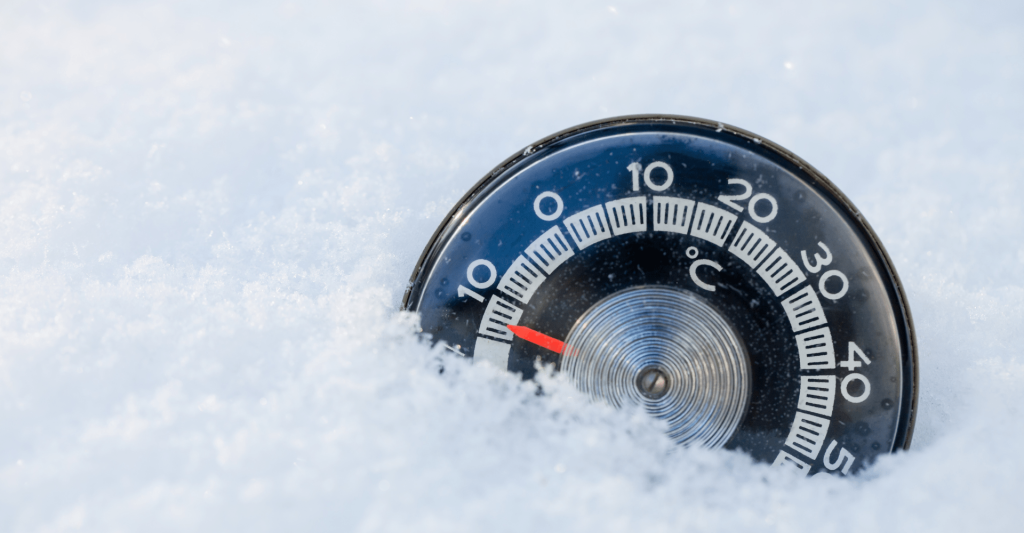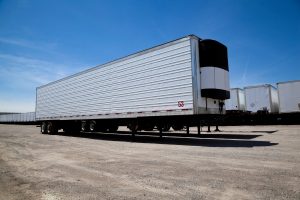
Temperature-controlled shipping is an essential component of the supply chain for industries such as food and pharmaceuticals, where the integrity of perishable goods is paramount. The backbone of temperature-controlled shipping is reefer trailers, specialized trailers that can maintain a specific temperature range during transit. As a 3PL provider, our role in temperature-controlled shipping is to provide reliable and efficient logistics and transportation services for our clients’ temperature-sensitive goods.
Keep reading to learn the importance of reefer trailers in temperature-controlled shipping, the benefits they offer, and how 3PL companies like us utilize them to ensure the safe and timely delivery of our clients’ goods.
What are Reefer Trailers?
Reefer trailers are specifically designed to transport temperature-sensitive goods such as fruits, vegetables, dairy products, meats, and pharmaceuticals. The “reef’ part of the name is a shortened version of “refridgerator.” These trailers come equipped with a refrigeration unit that can be set to maintain a specific temperature range. The temperature range typically varies between -20 to 70 degrees Fahrenheit, depending on the specific requirements of the cargo being transported.
Reefer trailers are available in various sizes and configurations, including straight trucks, semi-trucks, and intermodal containers. They are equipped with insulation and refrigeration units that help maintain the required temperature and humidity levels during transit. This ensures that the products remain fresh, safe, and of high quality when they reach their destination.
Benefits of Using Reefer Trailers for Temperature-Controlled Shipping
Maintaining the Integrity of Perishable Goods

Maintaining the integrity of perishable goods is critical to the success of industries such as food and pharmaceuticals, where even minor temperature deviations can compromise the quality and safety of the products.
Temperature fluctuations can affect the physical properties of products, such as changing the texture, color, or taste of food products. In some cases, temperature deviations can also lead to bacterial growth or contamination, increasing the risk of foodborne illnesses or other health hazards. Therefore, it is crucial to maintain strict temperature control during transit to ensure the quality and safety of temperature-sensitive products.
Reducing Spoilage and Waste
The use of reefer trailers reduces spoilage and waste, which can result in significant cost savings for businesses. Exposure to temperatures that are too high or too low can cause food to spoil or pharmaceuticals to degrade, rendering them unsafe for consumption or use. When perishable products spoil, they cannot be sold or used, resulting in a direct loss of revenue for the business. Additionally, businesses may incur additional costs to dispose of spoiled or expired products properly, such as paying for disposal services or environmental fees.
Meeting Regulatory Requirements
Using reefer trailers helps meet regulatory requirements and industry standards, ensuring compliance with health and safety regulations. Reefer trailers are often inspected and certified by regulatory agencies, ensuring that they meet strict safety and quality standards before they are used to transport temperature-sensitive products. This certification helps businesses demonstrate their commitment to compliance with health and safety regulations, reducing the risk of non-compliance and associated penalties or legal issues.
Using reefer trailers can also help businesses comply with international shipping regulations, such as those set by the International Maritime Organization (IMO), which require the transportation of temperature-sensitive goods to meet specific safety and quality standards.
Providing Real-Time Monitoring

Reefer trailers equipped with real-time monitoring systems provide visibility into the temperature, and humidity levels of the cargo, ensuring that any issues can be addressed promptly. These systems use advanced sensors and software to track the cargo’s temperature and humidity levels continuously, providing real-time data that can be accessed by the shipper, carrier, and receiver.
This real-time data can help businesses identify and address any issues that may arise during transit, such as temperature fluctuations, humidity imbalances, or equipment malfunctions. By addressing these issues promptly, businesses can minimize the risk of product spoilage or damage, ensuring that the cargo remains fresh and safe.
Providing Real-Time Tracking
Real-time tracking systems that reefer trailers are equipped with can provide visibility into the location of the cargo, allowing businesses to track its progress and estimated time of arrival accurately. This information can help businesses optimize their supply chain operations, ensuring that the products are delivered on time and in optimal condition.
The Features of a Reefer Trailer
Reefer trailers are distinct from regular trailers in several key ways:
- Temperature Control:
- Refrigeration Unit: Reefer trailers are equipped with a refrigeration unit or cooling system that can both cool and heat the interior of the trailer. This system helps maintain a specific temperature range, typically between -20°F to 70°F (-29°C to 21°C), depending on the cargo requirements.
- Temperature Monitoring: Reefer trailers have temperature sensors and monitoring systems to ensure cargo temperature remains within the desired range. These systems often have alarms to alert operators to temperature deviations.
- Insulation:
- Reefer trailers have thick insulation in the walls, floor, and ceiling to prevent external temperature fluctuations from affecting the cargo inside. This insulation helps maintain a stable interior temperature.
- Air Circulation:
- Reefer trailers have fans and ducts to ensure even distribution of conditioned air throughout the cargo space. This prevents temperature stratification and ensures consistent cooling or heating.
- Control Systems:
- Reefer trailers are equipped with control panels that allow operators to set and adjust the desired temperature, humidity, and other environmental conditions for the cargo.
- Power Sources:
- Reefer trailers require a power source to operate the refrigeration unit. They can be powered by the tractor unit (using a generator), shore power, or an independent power unit (APU). Some advanced models also have electric or hybrid systems for greater efficiency.
- Cargo Access:
- Reefer trailers typically have insulated cargo doors with gaskets to maintain the integrity of the temperature-controlled environment when loading and unloading.
- Cargo Compatibility:
- Reefer trailers are designed to accommodate a wide range of temperature-sensitive cargo, including perishable goods like food, pharmaceuticals, chemicals, and more.
- Regulatory Compliance:
- Due to the transportation of sensitive cargo, reefer trailers are subject to various regulations and standards to ensure the safety and quality of the transported goods. This includes compliance with food safety regulations (e.g., HACCP) and transportation industry standards.
- Maintenance and Cleaning:
- Reefer trailers require regular maintenance to keep the refrigeration unit and insulation in optimal condition. They also need thorough cleaning to prevent contamination between different shipments.
How 3PL Companies Use Reefer Trailers for Temperature-Controlled Shipping

As a 3PL provider, we use reefer trailers extensively in our temperature-controlled shipping operations. Our first step is to source reefer trailers that meet our clients’ specific needs, whether they require a straight truck or a semi-truck. We also provide specialized logistics and transportation services for temperature-sensitive goods, including load planning, routing, and scheduling.
We work closely with our clients to ensure that their products are transported safely and efficiently, using the latest technology to monitor and track the shipment’s progress. We also ensure compliance with regulations and industry standards, such as the FDA Food Safety Modernization Act (FSMA) and Good Distribution Practices (GDP), which are critical for maintaining the safety and integrity of temperature-sensitive products. By leveraging our expertise and experience, we provide our clients with reliable and efficient temperature-controlled shipping services.
Reefer trailers are the backbone of temperature-controlled shipping, providing businesses with a reliable and efficient way to transport temperature-sensitive goods safely. As a 3PL provider, we at R2 play a critical role in temperature-controlled shipping by providing specialized logistics and transportation services that help our clients maintain the integrity of their products.
